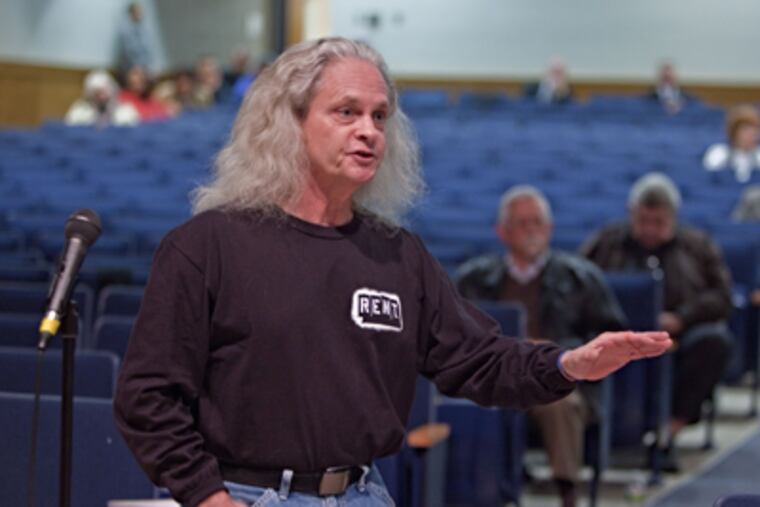Superintendent wage caps get mixed reception
The Christie administration's superintendent wage caps got mixed reviews Tuesday night at the state's fourth and final public hearing on the proposed regulations.

The Christie administration's superintendent wage caps got mixed reviews Tuesday night at the state's fourth and final public hearing on the proposed regulations.
An audience of about 50 parents, school board members, educators, and superintendents gathered at the Burlington County Institute of Technology's Westampton campus for the 90-minute hearing.
Laying the rationale for the cap, Eric Taylor, the state official representing the Office of Statute and Code Review, said that New Jersey's superintendents on average earn more than those in neighboring states but oversee smaller districts.
Last year, he said, the average New Jersey base superintendent pay was $167,994, compared with $121,000 in Pennsylvania and $162,873 in New York. He said both states tended to have districts twice as large as New Jersey's.
Audience member Thomas Floyd of Willingboro was dissatisfied with superintendent pay and quality.
"We as a state that cares about our children can no longer afford to have these people in there who can't do their jobs," Floyd said.
Thomas Yarnall of Cherry Hill also spoke in favor of the caps and called for well-defined job descriptions for superintendents.
Several speakers, however, said superintendents' salaries should be decided locally, and they expressed concern about the caps' impact on districts.
Bob Willoughby of Tabernacle took exception to Gov. Christie's suggestion that superintendents should not make more than he does.
"It's up to the Board of Education I help to elect," he said. "I don't want any outside person making that decision."
Jack Lyness, president of the Summit school board, said the state would suffer a dearth of high-quality leaders if the caps took effect.
"It is naive at best to believe we will fill positions with exceptional leaders with uncompetitive compensation," he said.
Mark Raivetz of Haddon Township, named superintendent of the year by the New Jersey Association of School Administrators, said that the proposed caps did not take into account such factors as regional cost-of-living differences and that some principals will make more than superintendents and have tenure, creating disincentives to becoming a superintendent. He also said that administrative costs as a percentage of total education spending in New Jersey are lower than in most states.
While he said he viewed the caps as a done deal, he held out hope that the issue would be revisited.
"Let's discuss this with the civility and respect it warrants," he said.
In an earlier interview, Raivetz said the salary cap was one of the reasons he had decided to not seek to have his contract renewed when it expires in 2012.
The salary caps, which would go into effect Feb. 7, are part of cost-cutting measures the administration has said would save about $9.8 million and keep more dollars in classrooms.
According to state education officials, 366 superintendents - about 70 percent - are paid above the salary limits and would face wage cuts when their contracts expire. Most are in northern and central New Jersey.
Under the proposed regulations, superintendents' base pay would vary by district enrollment. In school systems with up to 250 students, the top administrator's salary would be capped at $125,000. Districts with 6,501 to 10,000 students could offer a base salary of up $175,000. Larger districts could seek state approval to pay more.
There are ways superintendents could earn more. The regulations would allow districts to grant one-year merit bonuses of 2.5 percent to 14.9 percent. The bonuses would come for meeting performance-based criteria or goals set by local school boards and approved by the state.
Since last month, the state has blocked two districts - Parsippany in Morris County and Westfield in Union County - from extending their superintendents' contracts at pay levels that would exceed the cap.
Parsippany is challenging the move in New Jersey Superior Court.